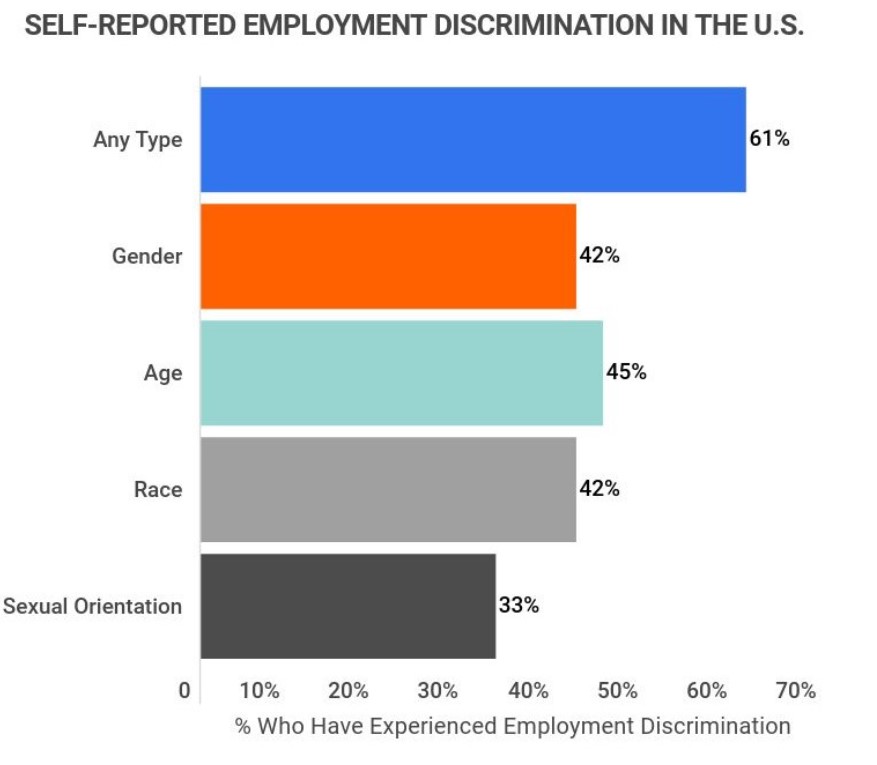Do you want to know how to combat age discrimination in your job search? Then you are in the right place!
Age discrimination is a real issue faced by many experienced professionals during their job search. It can manifest subtly, from being overlooked for younger candidates to facing questions about how long you plan to stay in the workforce.
Here, we will explore how to combat age discrimination in your job search. Whether you’ve noticed age bias during interviews or are concerned about it affecting your chances of getting hired, understanding and addressing it head-on is crucial. Let’s dive into strategies that can help you navigate the job market confidently, highlighting your strengths and experience.
See Also:
Understanding Age Discrimination

Source: Zippia
Statistics shows that about 45% Americans has experienced age discrimination during employment and job search.
Age discrimination refers to treating someone unfavourably because of their age. The job market often involves bias against older candidates, especially those over 50, despite their valuable experience. This can range from subtle comments about culture fit to more overt rejections, with younger candidates being preferred. So, let’s figure out how to combat age discrimination.
Addressing age discrimination is important because it limits diversity and denies businesses the opportunity to benefit from various perspectives. Experienced workers bring institutional knowledge, leadership skills, and a wealth of industry insights that can drive growth. Recognising and tackling this bias protects your rights and helps organisations create a more inclusive and productive work environment.
Preparing Your Job Application
Regarding your job application, combating age discrimination starts with how you present yourself on paper. The goal is to showcase your experience while demonstrating that you’re adaptable, tech-savvy, and up-to-date with industry trends.
Tips for Crafting a Modern Resume
Crafting a modern resume is essential to break any preconceived notions employers may have about older candidates. Here’s how you can modernise your resume:
- Focus on Relevant Experience: Highlight skills and experiences from the last 10-15 years to show you are actively engaged in the industry.
- Use a Contemporary Layout: Choose a clean and simple design. Avoid dated formatting like Times New Roman fonts or excessive bullet points.
- Remove Dates for Early Jobs and Education: Only include dates for roles and qualifications within the last 15 years, as older dates may reveal your age unnecessarily.
- Emphasise Achievements Over Responsibilities: Focus on results-driven accomplishments that reflect your impact in previous roles rather than listing outdated responsibilities.
- Include Recent Skills and Certifications: Showcase your commitment to lifelong learning by listing recent courses, certifications, or skills, particularly in tech.
Strategies for Writing a Compelling Cover Letter
Your cover letter offers another opportunity to combat age discrimination. You need to know how to craft a compelling cover letter carefully to position your experience as a strength and demonstrate that you’re a dynamic, forward-thinking candidate.
- Address Concerns Preemptively: If there’s an opportunity, address any concerns employers may have about your age by emphasising your energy, adaptability, and desire for a long-term role.
- Demonstrate Alignment with Company Culture: Research the company culture and mention how your values align with theirs to show you’ll be a great fit, regardless of age.
- Highlight Relevant Tech Skills: Emphasize your proficiency with modern tools and technology, reassuring employers that you are tech-savvy and adaptable.
- Focus on the Future: Speak to the future contributions you hope to make rather than dwelling too much on past experience, signalling that you are forward-thinking.
- Convey Enthusiasm and Energy: Your cover letter should reflect genuine excitement for the role, positioning you as an energetic candidate ready to contribute.
See Also:
Optimising Your Online Presence
Your online presence, particularly on LinkedIn, significantly influences how potential employers perceive you. You can counteract age discrimination using an up-to-date and active LinkedIn profile, showcasing your engagement with current trends.
Updating LinkedIn and Professional Profiles

Source: Resumego.net
According to Statista, a person’s LinkedIn profile boost their chance of getting jobs by 71%. Ensure your LinkedIn profile reflects your most recent skills, accomplishments, and professional development. Here are vital steps to optimise your profile:
- Use a Professional, Current Headshot: A polished, up-to-date photo projects professionalism.
- Update Your Headline and Summary: This space highlights your unique skills and experience while conveying that you’re excited about future opportunities.
- Engage with Relevant Content: Commenting on industry trends, sharing articles, or writing your content signals that you’re current and involved in your field.
- Request Endorsements and Recommendations: Ask for endorsements and recommendations from recent colleagues or clients to reinforce your credibility.
Networking Effectively
Networking is one of the most powerful tools in combating age discrimination. Cultivating strong relationships within your industry can help you bypass traditional hiring biases and get your foot in the door through referrals. Attend industry events, join professional groups, and be active on platforms like LinkedIn to maintain visibility. Personal connections can lead to interviews and job offers where your experience is valued above any concerns about age and can also help you navigate when you get a job at a new workplace.
See Also:
Navigating the Interview Process
The interview process can be challenging when you’re concerned about age bias. However, you must learn how to prepare for interviews to allows you to control the narrative, showcase your strengths, and project confidence.
Addressing Age-Related Questions Confidently
You may face age-related questions during interviews. Here’s how to tackle them confidently:
- Be Positive and Assertive: When asked about your age or experience, confidently answer and emphasise the value you bring.
- Reassure Longevity: If asked about your career plans, mention your commitment to continuous growth and highlight your enthusiasm for long-term contributions.
- Mention Flexibility: Address concerns about adaptability by sharing examples of how you’ve embraced new technologies or workflows.
- Be Prepared for Culture Fit Questions: Highlight examples of working in diverse teams, showing that you can thrive in environments with colleagues from different age groups.
Framing Age as an Asset Rather Than a Liability
One of the best ways to combat age discrimination is by framing your age as an advantage. Use the following strategies:
- Highlight Experience-Driven Problem Solving: Showcase examples where your years of experience allowed you to solve complex problems or lead teams successfully.
- Emphasise Leadership Skills: If you’ve led teams, talk about your leadership style and how you’ve mentored younger colleagues.
- Speak to Industry Knowledge: Mention any deep industry insights that younger candidates may lack, making you a valuable asset.
- Showcase Professional Networks: Highlight your connections within the industry as a resource that could benefit the organisation.
Practicing Responses to Common Biases
To combat age-related biases, it’s essential to be prepared with responses that shift the focus to your strengths:
- “Are You Overqualified?” – Respond by saying you’re looking for a role where your experience aligns with the company’s long-term goals and you’re excited to contribute at this stage in your career.
- “Will You Be Comfortable with Technology?” – Emphasize your experience using modern tools and share any recent certifications or courses you’ve taken to stay up-to-date.
- “Do You Fit with Our Younger Team?” – Share examples of how you’ve successfully worked in diverse, multi-generational teams.
Legal Protections Against Age Discrimination
There are legal protections in place to combat age discrimination. In the U.S., the Age Discrimination in Employment Act (ADEA) prohibits discrimination against individuals over 40. Similarly, in the UK, the Equality Act 2010 protects workers from age-based discrimination. If you believe you’ve been unfairly treated, consult an employment lawyer specialising in discrimination cases. Keep documentation of job application processes and interviews, and be proactive in seeking legal advice if needed.
See Also:
How RKY Careers and Apply Buddy Can Help You Overcome Age Discrimination

Having the right support system is crucial when navigating age discrimination in your job search. RKY Careers, one of the top career consulting firms, provides personalised services to help you strategically approach the job market. Among their many offerings is Apply Buddy, a unique service designed to help you apply for jobs on your behalf with a high success rate.
Apply Buddy stands out by taking the hassle out of job hunting, particularly for older candidates who may face age-related biases. This service streamlines the application process, ensuring that your tailored resume, cover letter, and online profiles are optimised for each job submission. With RKY Careers’ expertise, you gain access to industry-specific insights, allowing Apply Buddy to match your skills to the right opportunities.
What makes RKY Careers exceptional is their deep understanding of overcoming challenges like age bias. Their experts help you position your experience and skills in a way that appeals to modern employers, ensuring that your application doesn’t get lost in the noise. The high success rate of Apply Buddy demonstrates how effective a data-driven, expert-supported approach can be for experienced candidates looking to combat age discrimination and secure fulfilling job roles.
Conclusion
Finally, a persistence and a strategic approach is the right approach on how to combat age discrimination in your job search. By modernising your resume, optimising your online presence, and preparing for potential biases, you can confidently showcase the value of your experience. Remember that your age is an asset, not a liability. With the right mindset, you can land the job that matches your skills and aspirations.
FAQs for How to Combat Age Discrimination in Your Job Search
- What signs should I look for to identify age discrimination during the hiring process?
- Look for signs like subtle comments on your age, concerns about your ability to adapt, or repeated rejections despite qualifications.
- How can I present my experience and skills in a way that counters age-related biases?
- Focus on relevant, recent achievements, demonstrate adaptability, and emphasise up-to-date technical skills.
- What legal protections exist to help me address age discrimination in my job search?
- Laws like the ADEA in the U.S. and the Equality Act in the UK offer protection against age discrimination.
- How can I stay competitive in the job market and showcase my adaptability despite potential age biases?
- Engage in continuous learning, stay updated on industry trends, and maintain a modern online presence.
